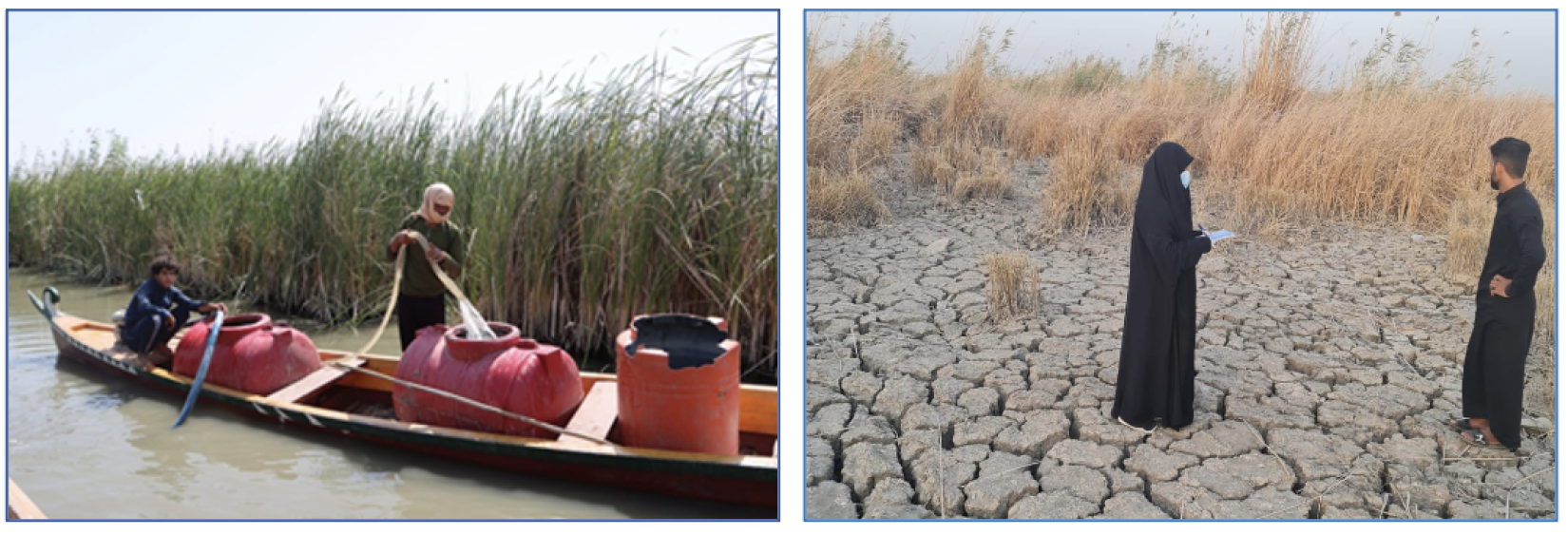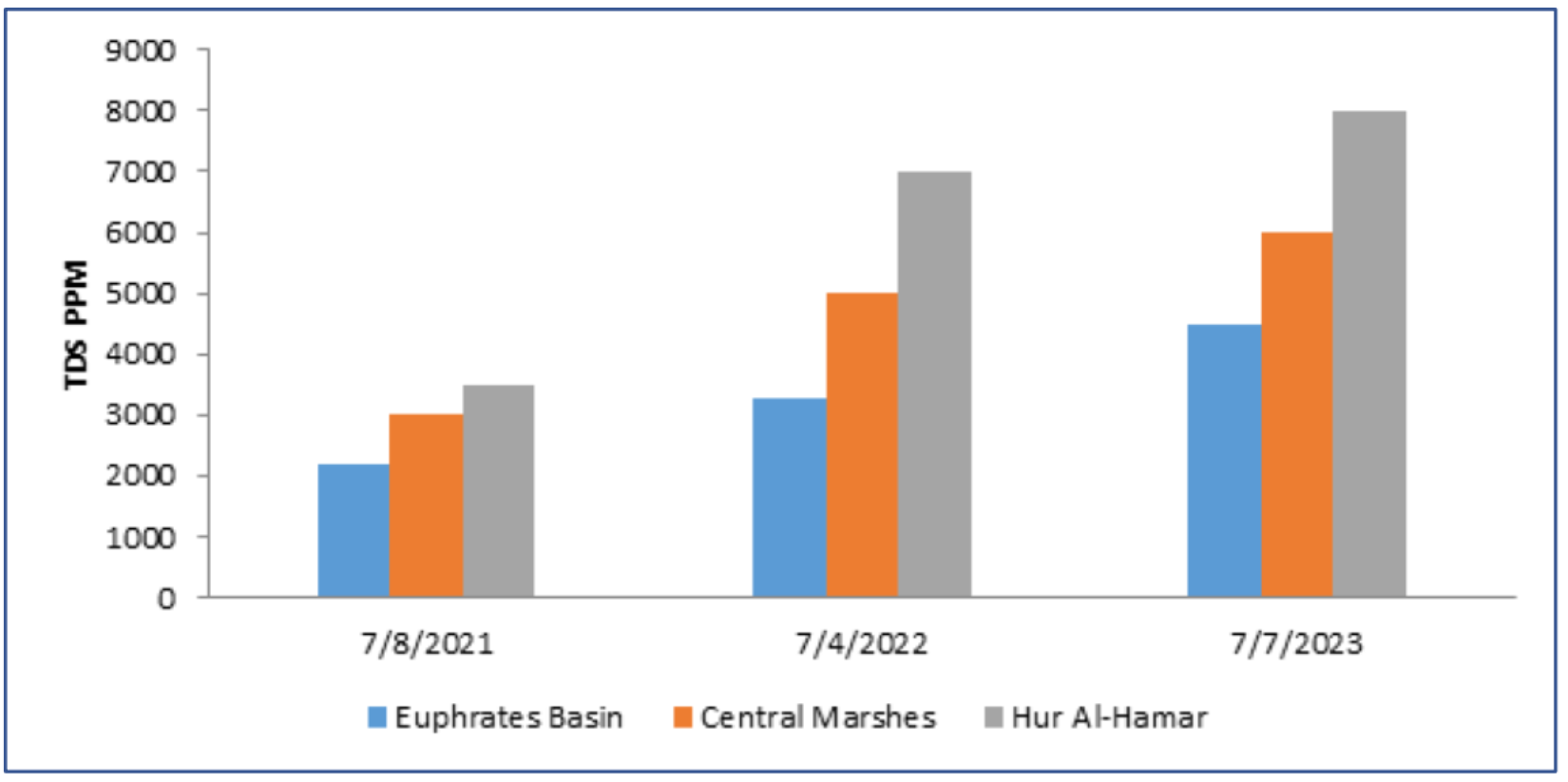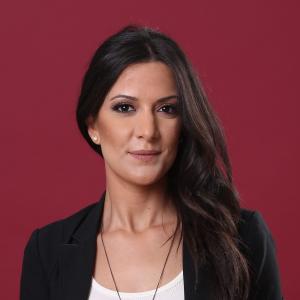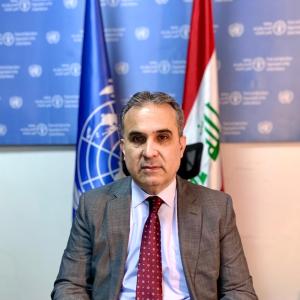FAO Renews its Call for Urgent Action to safeguard Iraq's Marshes and Buffalo Producers from Severe Climate Change and Water Scarcity
10 July 2023

FAO Iraq is deeply concerned about the grave consequences of climate change and water scarcity on the marshes (Al Ahwar) and buffalo producers in the Southern Iraq. Alarming field reports from the project team, which the organization is implementing in cooperation with the Ministry of Agriculture (MOA) and European Union (EU) funding, indicate that the marshes are experiencing the most severe heat wave in the last 40 years, accompanied with a sudden water shortage in the Euphrates River. The dire situation is having a devastating impact on the marshes system; buffalo producers, farmers, and fisheries forcing many of them leave their homes and migrate mainly to Salah Eddine, Najaf, Karbala and Babel in the central part of Iraq and other cities, searching for drinking water, food, feed and employment.
In the aftermath of FAO's urgent call in 14 July 2022 to support buffalo producers and protect the valuable ecosystem of Al-Chibayish –AlAhwar, FAO with EU support and in coordination with the Iraqi Ministry of Agriculture (MOA) mobilized emergency support for more than 5000 livestock farmers in different forms. Unfoutunaly, the current situation in July 2023 reflects a grim picture.
On the 7th of July 2023, FAO-MOA project team presented an alarming reports, Rissan Mohsen Zghir, member of the team, reported worrying information highlighting the dire situation in Al-Chibayish , the water level of the Euphrates is only 56 centimetres, and in the marshes from zero to 30 centimetres, with a staggering 90% dryness rate. High salinity levels exceeding 6000 ppm, have raised concerns among farmers, particularly buffalo breeders and fisheries. Additionally, and according to the Center for Restoration of the Iraqi Marshes and Wetlands at the Ministry of Water Resources (CRIMW), almost 70% of the marshes are devoid of water.
Water levels and total dissolved solids (TDS) in different locations in the marshes,
July 2021-2022 & 2023 (Source: CRIMW)

Diagram depicting the evolution of Total Dissolved Solids (TDS) (ppm) in the marshes water
July 2021-2022 & 2023 (Source: CRIMW)

“The marshes buffaloes are currently suffering from malnutrition, and some dying from the salty water in the low-lying marshes, the urgency of the situation requires swift and decisive action “, said Dr Chedly kayouli - FAO Iraq Senior Livestock Expert.
According to FAO-EU-MOA field team information, and to address the water scarcity in the marshes and improve water access for buffalo, a government initiative has been proposed to deepen the canals and rivers that feed the marshes. However, due to the current water shortage, no water releases have been made to raise the Euphrates' water level. The available water supply is currently allocated solely for drinking purposes, exacerbating the challenges faced by buffalo breeders and the marshes ecosystem.
Dr Salah El Hajj Hassan, FAO Representative in Iraq, confirmed: "The severe water shortage, heat waves and drought in the marshes have put buffalo producers and the entire ecosystem at a very high risk, calling for an urgent short, medium and long-term actions to prevent further destruction and ensure a sustainable future for this Iraqi World Heritage site.”
FAO Representative added, “FAO Iraq with national and international partners is making continuous efforts to address the negative impacts of climate change, water scarcity and the challenges facing the Marshlands.”
Dr Abdulhakim El Wear, FAO Assistant Director-General and Regional Representative for the Near East and North Africa stressed that: “We are following with great concern the negative impact of climate change and water scarcity in the region, especially in the marshes in southern Iraq. FAO, in collaboration with national and international partners will strengthen its existing projects in the southern regions to support buffalo breeders and mitigate the negative impacts of water scarcity, water pollution, and climate change that threaten their lives and livelihoods, protecting the livelihoods of the region's farmers, breeders and to preserve the ecosystem is a collective responsibility.”
FAO Iraq re-calls on all stakeholders to unite in a spirit of cooperation and determination. Together, let us work diligently to protect the marshes, combat climate change, and ensure the well-being of present and future generations who depend on these invaluable resources.


He started his career in 1984, as Senior Research Assistant in the Agricultural Research and Education Centre (AREC), American University of Beirut. From 1987 to 1991, he was Coordinator of the Student Training Programme, and also Agriculture and Horticultural Teacher for the Faculty of Agriculture, at the Lebanese University.
From 1991 to 1995, he worked as Agricultural Engineer at the Ministry of Agriculture, Bekaa Regional Office, Zahlah and was then assigned to the Agricultural Research Institute in the Tal Amara station, first as Head of the Crop Production Department and subsequently in charge of the Plant Protection Laboratory. From 2002 to 2006, he was Director of the Kfardane Research Station (Agricultural Research Institute). In 2008, he became Visiting Scientist at the International Maize and Wheat Improvement Centre (CIMMYT) and Coordinator of a project with the International Centre for Atomic Energy Agency, Vienna.
In 2010, he served as Advisor to the Minister for Agriculture of Lebanon. In 2011, he became President of the Pesticide Scientific Committee, Head of the Phytoplasma Committee and Director of the Agriculture and Rural Development Programme (ARDP) (EU-funded project). From 2010 to 2013, he represented Lebanon in negotiations with EU, Egypt, Jordan and Iraq. During his career, Mr Hajj Hassan also carried out a number of other functions. He represented the Lebanese Agricultural Research Institute (LARI) in several research programmes with the International Centre for Agricultural Research in the Dry Areas (ICARDA) and the American University of Beirut. He was Coordinator of the Mashreq/Maghreb project with ICARDA, representing Lebanon in the Steering Committee, as well as being the Head of the Sugar-beet Delivery and of the Wheat Delivery Committees. For a number of years, Mr Hajj Hassan worked for the preparation of FAO TCP projects and served as the National Director of a TCP project. He joined FAO in January 2014 as FAO Representative in Yemen. Mr Hajj Hassan succeeds Mr El Zubi as FAO Representative in Iraq.


